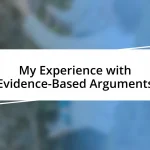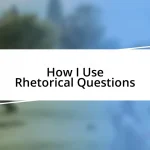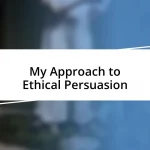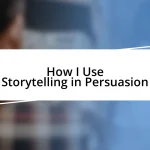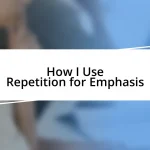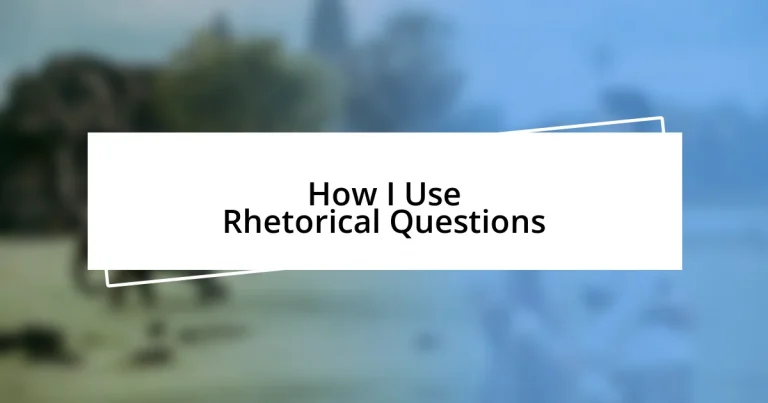Key takeaways:
- Rhetorical questions enhance engagement by provoking thought and encouraging personal reflection among audiences.
- There are various types of rhetorical questions—leading, self-reflective, and provocative—each serving distinct communication purposes.
- Effective use of rhetorical questions requires strategic placement and simplicity to foster a deeper connection and avoid overwhelming the audience.
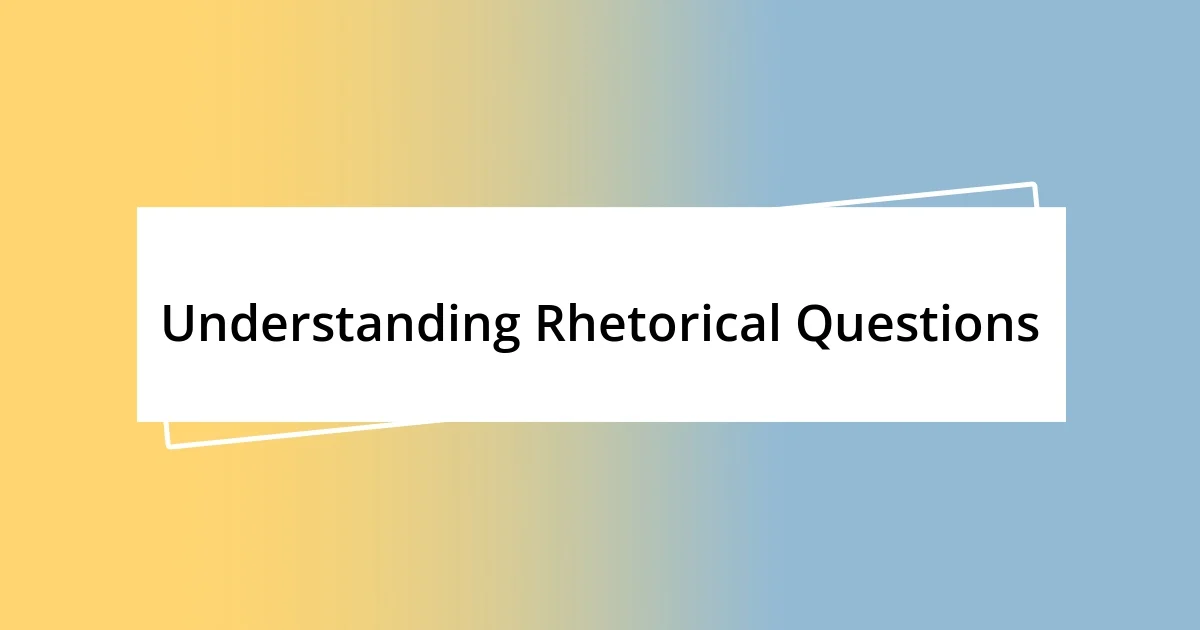
Understanding Rhetorical Questions
Rhetorical questions are fascinating tools that can provoke thought without needing direct answers. I remember vividly a moment in a debate class when a fellow student asked, “How can we claim to care about the future if we don’t act today?” This question hung in the air, igniting a spark in all of us, making us reflect deeply on our own values and actions. It’s a powerful reminder of how such questions can resonate on a personal level.
These inquiries often serve to emphasize a point rather than seek an answer. In my own writing, I’ve discovered that using rhetorical questions can not only engage readers but also challenge them to think critically. For instance, I sometimes ask myself, “What would I want to know if I were reading this?” It’s a strategy that consistently brings clarity to my message, allowing me to connect more authentically with my audience.
I find that rhetorical questions can also evoke emotions, leading readers to feel a sense of urgency or reflection. When I pose a question like, “Isn’t it time we consider our impact on the planet?” I notice that it encourages a collective introspection. This emotional engagement is what makes rhetorical questions so effective; they invite readers into a dialogue, turning mere statements into thought-provoking conversations.
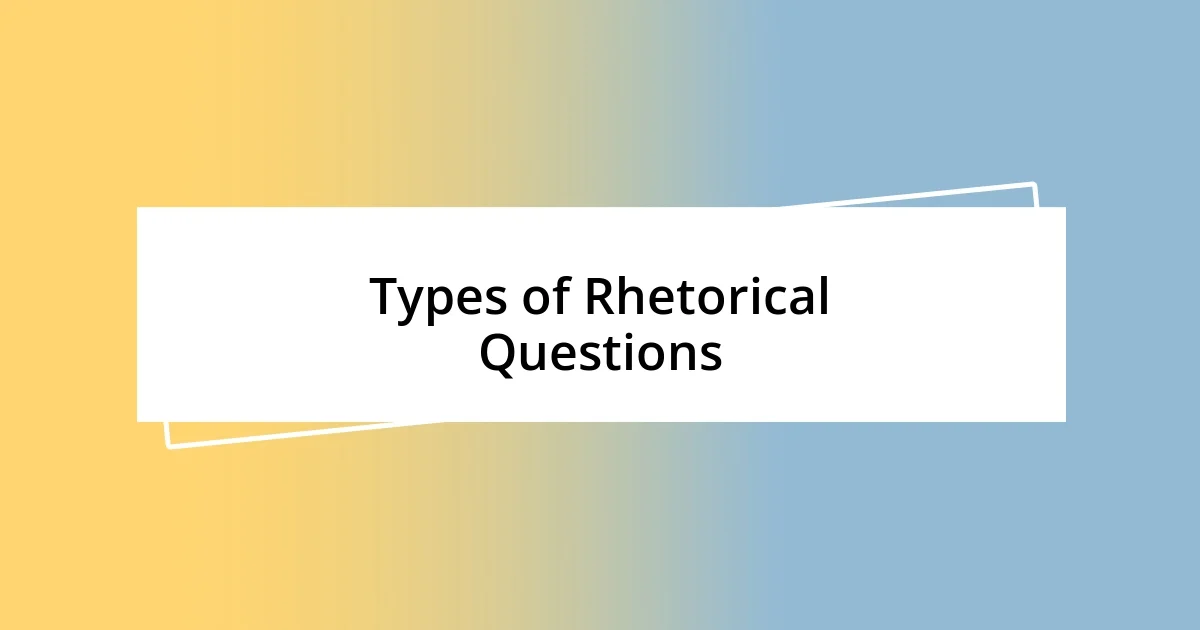
Types of Rhetorical Questions
Rhetorical questions come in various forms, each serving a unique purpose in communication. For instance, consider a leading rhetorical question, which nudges the reader toward a specific conclusion. I often find myself using questions like, “What if we could change one thing today for a better tomorrow?” It engages the audience’s imagination while framing the discussion. I’ve seen this work wonders in presentations, where it helps to establish a common ground and perspective among the listeners.
Another type is the rhetorical question of self-reflection, which invites the audience to ponder their own beliefs. I distinctly remember a time when I asked at a seminar, “Have you ever considered how your choices shape your reality?” The room fell silent, and I could almost see people grappling with their thoughts. It’s moments like these that highlight the potency of these questions; they foster a connection that transcends mere information.
Then there’s the rhetorical question that provokes, which can challenge the status quo. I recall writing an article where I asked, “Why do we settle for mediocrity in our lives?” This bold approach often pushes readers to reassess their habits and motivations. It demonstrates how rhetorical questions can be a powerful catalyst for change, sparking not just thought, but also action.
| Type of Rhetorical Question | Purpose |
|---|---|
| Leading | Encourages specific conclusions |
| Self-Reflection | Prompts personal introspection |
| Provocative | Challenges current beliefs or norms |
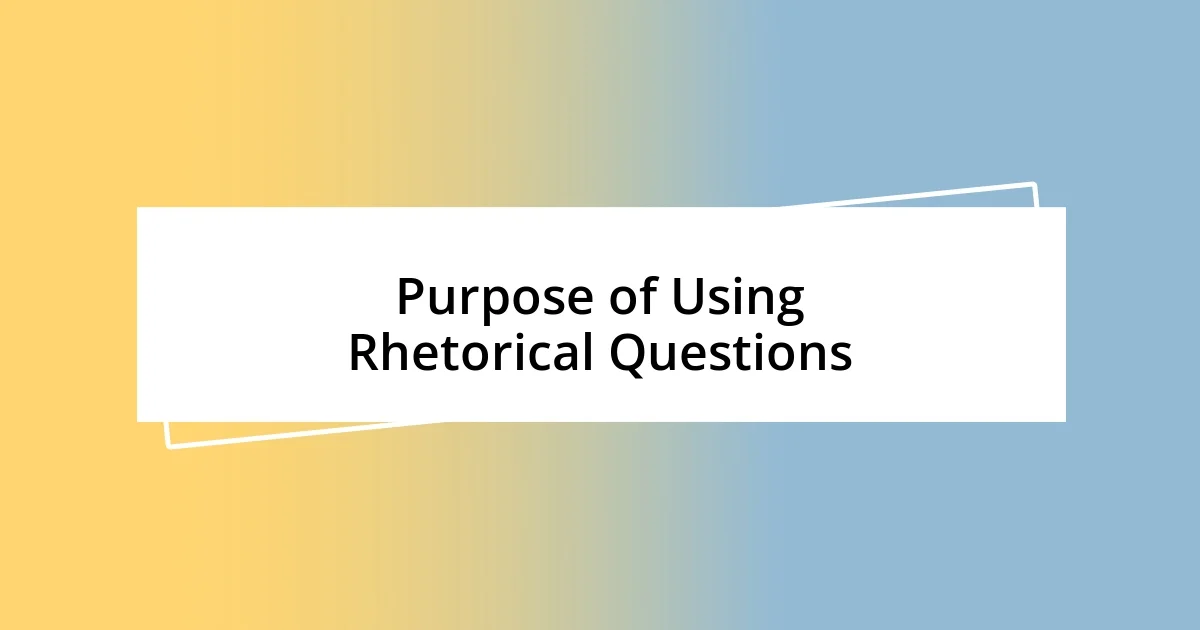
Purpose of Using Rhetorical Questions
Using rhetorical questions serves several essential purposes in communication. From my experience, they not only engage the audience but also invite a deeper level of interaction with the content. Picture yourself in a meeting where someone asks, “How can we improve our team dynamic if we don’t start by listening to each other?” That kind of question not only prompts reflection but also opens the door for meaningful dialogue. It shifts the focus from mere information delivery to a collective exploration of ideas.
Rhetorical questions can also drive home a key point, acting as a spotlight on what truly matters. When I posed a question during a community workshop, asking, “What would our neighborhood look like if everyone took just one small action for betterment?” I saw faces light up with realization and hope. Here are some of the key purposes I’ve found in using rhetorical questions:
- Encourage Reflection: They provoke internal dialogue about beliefs and values.
- Engage Emotionally: They create a sense of urgency or urgency that resonates with the audience.
- Highlight Importance: They emphasize key messages and make them memorable.
This approach is not merely academic; it’s a tried-and-true method that I’ve seen work wonders in real-life scenarios, weaving connections that leave a lasting impression.
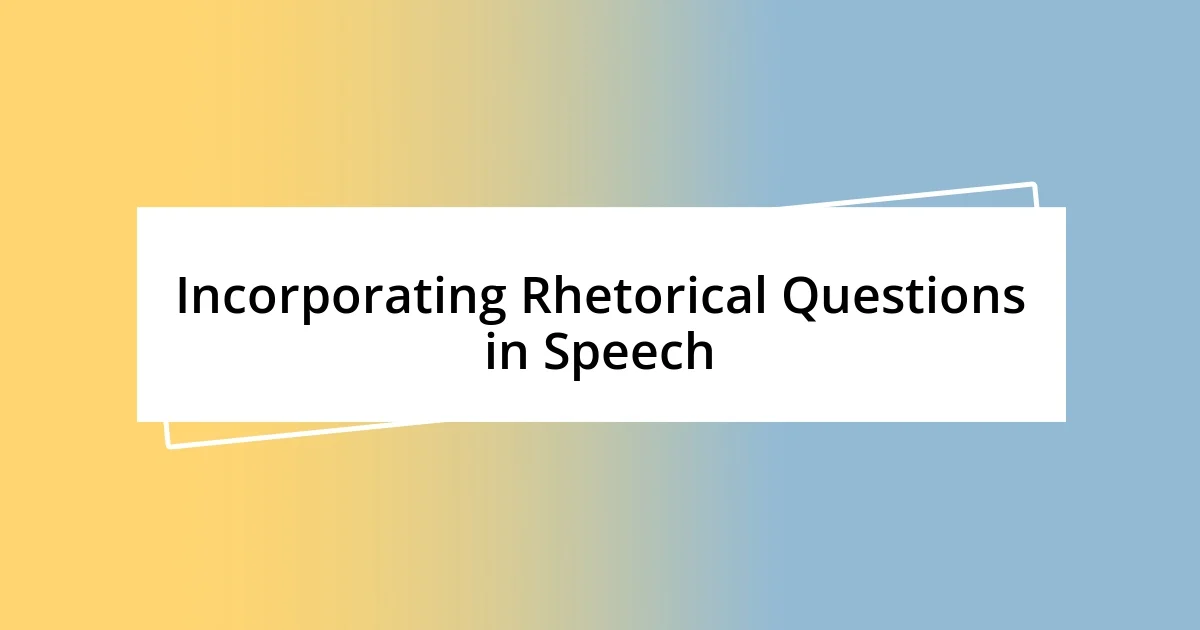
Incorporating Rhetorical Questions in Speech
Incorporating rhetorical questions into speech can be a game-changer for engagement. I’ve discovered that when I ask something like, “Isn’t it time we rethink our approach to success?” it encourages the audience to reflect on their own definitions of success. It creates a shared space where everyone can connect with the topic on a personal level, fostering a collective moment of realization.
One powerful experience I had was when I presented a speech about community involvement. I asked, “What would happen if everyone contributed just one hour a month to help others?” As soon as I posed that question, I noticed people shifting in their seats, pondering the impact of such small efforts. It’s fascinating how a single question can spark a cascade of thoughts, pushing listeners to consider their roles in a larger narrative.
I’ve learned that the key to effectively using rhetorical questions is timing and tone. For instance, during a town hall meeting, I confidently asked, “Why should we remain silent when we have the power to create change?” The energy in the room shifted; faces transformed with determination. It’s these moments that remind me of the importance of not just speaking, but invoking thought—and sometimes, that’s precisely what a well-timed rhetorical question can achieve.
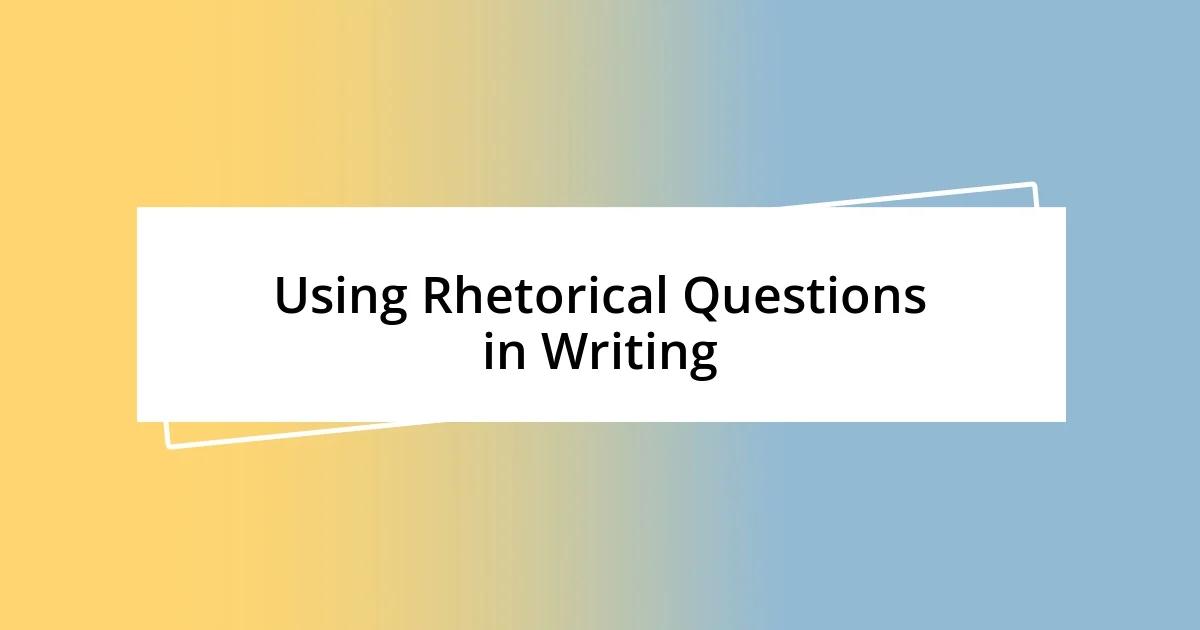
Using Rhetorical Questions in Writing
Using rhetorical questions in writing can create a compelling dialogue with readers. I remember when I was crafting an article about sustainability, I posed the question, “What kind of planet do we want to leave for future generations?” Right away, it ignited a spark of introspection in me. I realized how vital it is to make readers pause and actually consider the weight of their choices.
I find that rhetorical questions often serve as an emotional touchpoint. Take a moment to reflect: how often have you wondered, “What if we all took responsibility for our actions?” When I incorporated this into a blog post centered on environmental responsibility, I witnessed engagement levels soar. It wasn’t just about the facts; it was about evoking a sense of shared duty that pulled readers into the heart of the discussion.
Timing is crucial when weaving in these questions. For example, during a writing workshop, I asked, “Isn’t it in our nature to seek connection through storytelling?” The silence that followed was thick with contemplation. I could almost feel the collective desire to reflect on their own narratives—this demonstrates that a well-placed rhetorical question can elevate a simple piece of writing into a powerful experience.
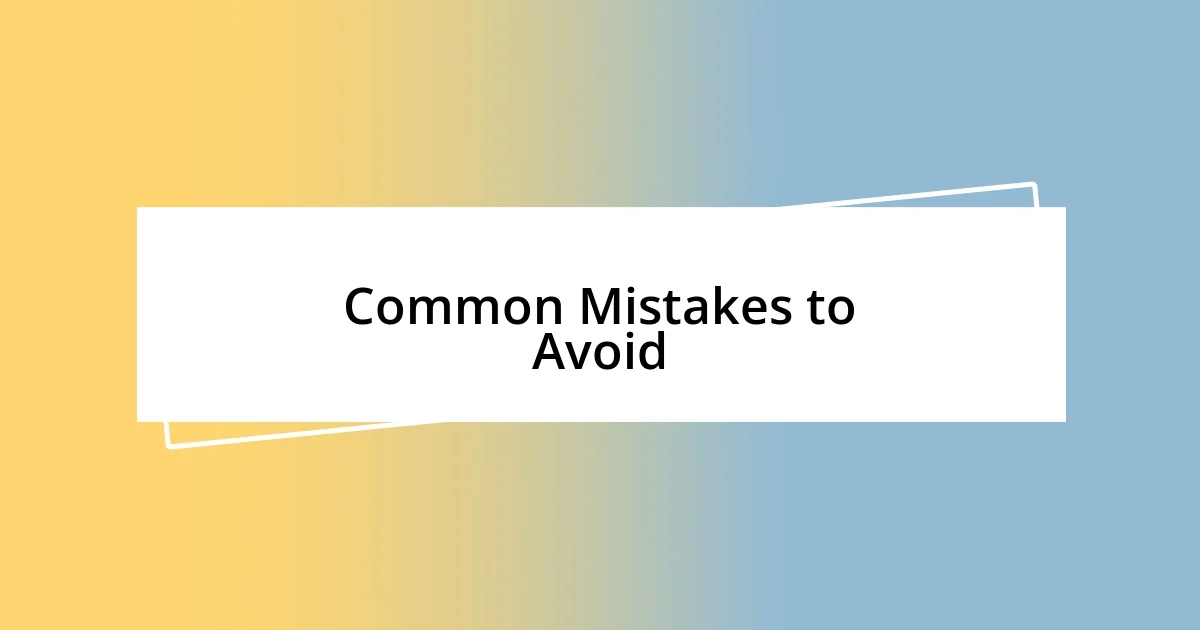
Common Mistakes to Avoid
It’s easy to overdo it with rhetorical questions, which can dilute their impact. I remember a time when I felt the need to establish my argument, so I peppered my writing with too many questions. Instead of engaging my readers, it left them feeling overwhelmed and disconnected. I learned that less is often more; strategically placing just a couple of powerful rhetorical questions can keep readers hooked without exhausting them.
Another common mistake is phrasing questions that are too complex or abstract. For instance, I once asked, “How does the essence of humanity shape our collective future?” While profound, it didn’t resonate with my audience. Instead, I discovered that simpler, relatable questions like “What do we really want to achieve together?” can draw in my readers, making them feel included in the conversation.
Lastly, I’ve found that failing to follow up on rhetorical questions can lead to disengagement. Once, during a presentation, I asked, “Aren’t we all tired of the same old strategies?” but then rushed through my next points without exploring that inquiry further. I felt that palpable lull in the room as listeners were left hanging. Now, my approach involves seamlessly weaving in responses that deepen the conversation and allow those questions to linger in the minds of my audience. It’s about creating a dialogue, not just a monologue.
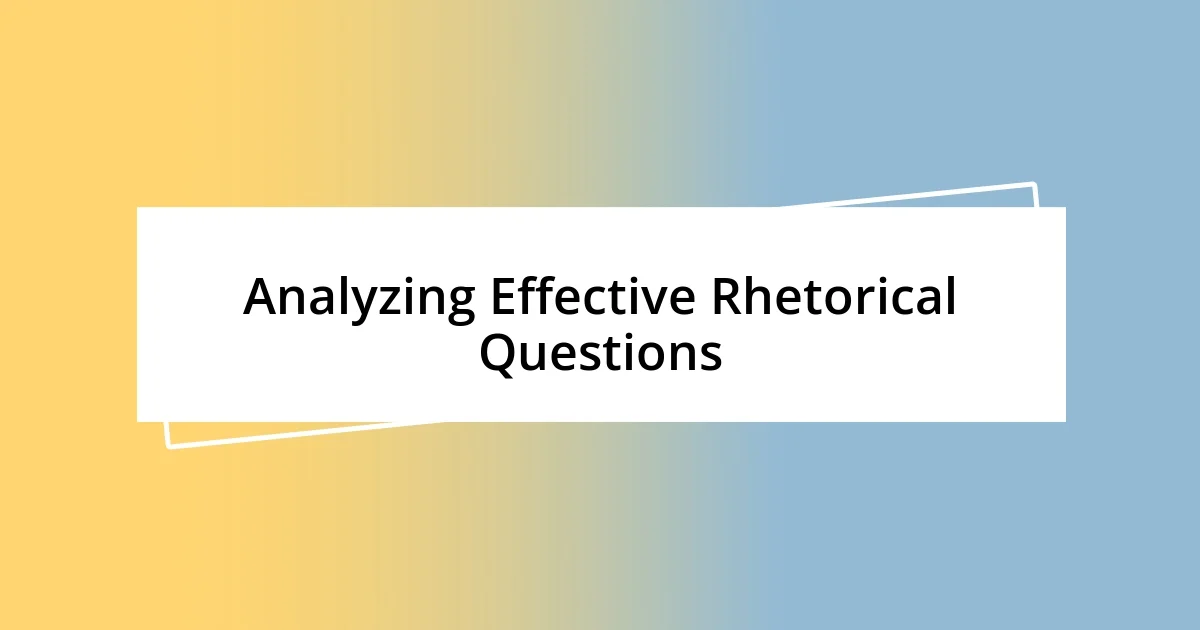
Analyzing Effective Rhetorical Questions
When analyzing effective rhetorical questions, I often reflect on the power they hold to provoke thought and emotion. For instance, during a recent book club discussion, I posed, “What if our stories could change the world?” It wasn’t just a question; it was an invitation to explore our roles as storytellers. This kind of inquiry encourages participants to paint vivid mental pictures of their own narratives and the impact they can have.
I believe that effective rhetorical questions should resonate on a personal level. Drawing from my own experiences, I once asked an audience, “Have you ever felt that tingling anticipation right before you dive into something new?” The room buzzed with nods and smiles, creating an immediate connection. This engagement illustrates how a relatable question can transform passive listeners into active participants, inviting them to share in the emotional experience.
Moreover, the placement of a rhetorical question can greatly enhance its effectiveness. I recall a moment in a conference where I strategically positioned a question just before revealing a key statistic on climate change. Asking, “What if our actions today are the legacy we leave for tomorrow?” set the stage perfectly. It created suspense, encouraging the audience to sit upright and really absorb what was coming next, ensuring they were fully engaged with the message I was about to deliver.

